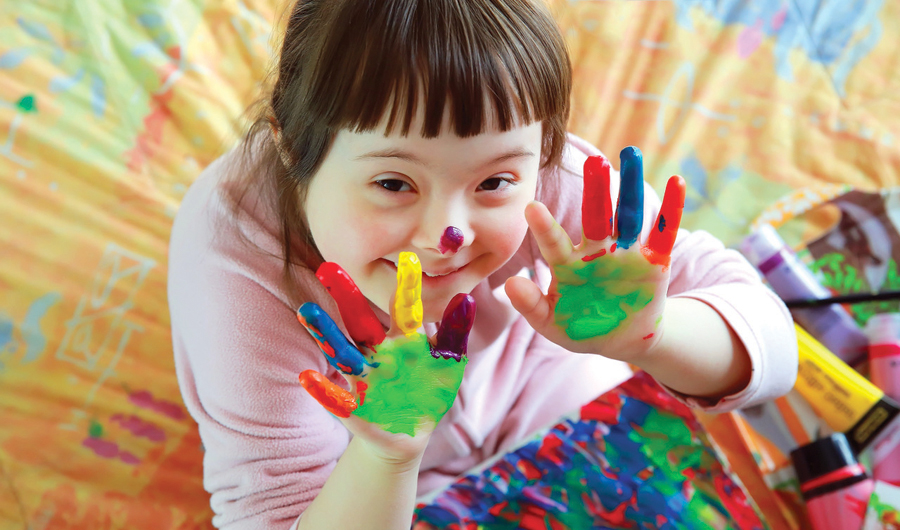RIYADH: Families who have children with special needs are facing many difficulties during quarantine, including the change of their daily routine, according to an autism and applied behavior therapist.
“They no longer go to the rehabilitation centers or schools, they no longer go out, which is causing tension and stress to them and their families. As a result, it increases the burden and responsibilities on the family,” said therapist Abeer Alshareef.
Currently working as the executive director of the Gadah Al-Madina Center For Autism, Alshareef told Arab News that family is an essential component of the rehabilitation and training of people with autism.
“Families are involved in the rehabilitation and training process by participating in the development of the individual plan for the child in cooperation with the team, taking into account the child’s abilities and requirements to train the parents accordingly,” she added.
Alshareef said there are many ways to entertain children with special needs at home that involve the whole family, including physical activities, coloring and baking.
“Families can search online and will find many fun activities that can be enjoyed by the whole family, strengthening family ties,” she added.
Naila Al-Radadi, a teacher and a mother of a nine-year-old girl with Down syndrome, said that her daughter is still taking online classes from the Efada Center for Down Syndrome in Riyadh.
The courses Al-Radadi’s daughter Ghala takes include alphabets, math and word banks. She said that parents are involved in the classes.
Al-Radadi’s daughter took a personal picture wearing a green dress that resembles the Saudi national flag for her school project and sent it to her friends with an inspirational note to lift their spirits during the pandemic.
“We enjoy playing with Ghala as a family, she loves to play hockey and basketball in the backyard with her siblings and father. And because she is a girl, she loves to play dress-up and put makeup on and dance. She also has a small kitchen that she loves to play with,” Al-Radadi said.
HIGHLIGHTS
• Family is an essential component of the rehabilitation and training of people with autism, says expert.
• There are many ways to entertain children with special needs at home that involve the whole family, including physical activities, coloring and baking.
Randa Al-Ahmadi, a human resources officer at a food company and a mother of a 10-year-old autistic son, told Arab News that quarantine made things difficult for her
at first, but her son Abdullah has gotten used to the situation.
Autistic children must learn a few points about quarantine to accept the situation, she said, including ways to explain the coronavirus crisis.
“Simplify all information about coronavirus and how to deal with this pandemic in an easy way, such as washing hands through a simple song for 40 seconds so that the child sings it while he washes his hands enjoyably,” Al-Ahmadi added.
She said that interacting with autistic children and constantly reminding them of the information they learn from their schools on a regular basis is vital.
Al-Ahmadi also highlighted the importance of indoor activities so autistic family members do not feel marginalized or isolated. These could include arranging the dining table and helping with chores, she said.
She said it is the parents’ duties to follow up on their children’s educational classes in a child-friendly way, such as the use of educational CDs.
She pointed out that it is essential to involve an autistic child with their siblings and encourage dialogue between them. Al-Ahmadi said that patience was the most important trait parents of children with special needs must have. She added: “Parents should explain to their autistic children any situation happening around them in a very easy and simple way … on the surface, it seems that autistic children don’t understand what the parents are saying, but they will eventually.”
There are 450,000 people with intellectual disabilities in Saudi Arabia, according to Princess Reema bint Bandar, Saudi envoy to the US and board member of the Future Investment Initiative (FII) Institute.
In the FII’s first virtual event, Princess Reema raised the issue of disabled people, highlighting the importance of meeting the needs of this special segment of society during the virus crisis.
“One of the things that break my heart is that we’ve looked at the containment of this virus without looking at the aggregated data of the individuals with disabilities,” she said.

from Saudi Arabia https://ift.tt/3cXIZQV
via Latest News of Dubai

0 Comments